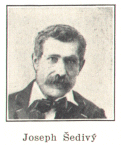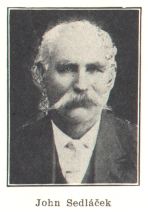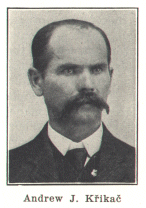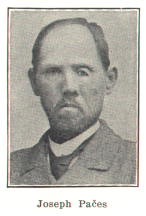 |
Boyd County--1890 |
This is a NEGenWeb Project web page
and is presented as part of the
MARDOS Memorial Library Collection.
Boyd County--1890
|
Boyd County originally was an Indian reservation, the eastern half belonging to the Ponca Reservation (from which the stream traversing the whole county takes its name) and the western half belonged to the Rosebud Reservation. The larger part of this latter reservation was in South Dakota and was opened to settlers in 1891. However, many settled there under the so-called "squatter's right" in 1890, and thus had the opportunity to choose the best lands. 
Probably the first Czech to settle here was Joseph Sedivy, born in 1857 in Srdecnice, who came to Niobrara with his parents in 1869, from Chicago. They lived in Niobrara in a log house during the winter. It burned down in the spring and left them destitute. About two years later they moved to Pishellville, where the Indians stole about all they had. Later, in May, 1890, Sedivy took a claim near Lynch, Boyd County, and that same year was followed by others. 1890--The Following Came: Joseph, Frank, John and Ben Sedivy, all born in Srdecnice; Thomas Velfel, born in 1855 in Vitkovice, Budejovice; Joseph Fiser, born 1863 in Petrovice, Trebon. 1891--The Following Came: John and Frank Hajek, born 1862 in Chot'anky, Podebrady; Joseph Hajek, born in Knox County; Joseph Fiser, born 1848 in Nova Ves, Kralove Hradec; Joseph Micanek, born 1848 in Lisne, Jihlava; Joseph Vasatko, father-in-law of John Korab. Born 1836 in Bohemia, died in 1912. Came to Nebraska from Linn County, Iowa. Joseph Micanek Jr., born 1871 in Lisne, Jihlava; Joseph Kalal, born 1858, died 1902; Joseph Slama, born 1844 in Lisne, Jihlava, died 1924; John Bures, Krizanky, Nove Mesto; Frank Kukal, born 1836, died 1917; Joseph Vomacka, born 1848 in Sadska; Frank Nermut, born 1849 in Zeliv, Caslav, died 1924. 1892--The Following Came: John Korab, born 1863 in Borova, Policka; Martin Slamsidlo, born 1855 in Vodnany; John Rihanek, born 1871, Nemecka Briza, Plzen. 1893--The Following Came: Daniel Melsha, born 1871 in Linn County, Iowa. Others who lived there in the early nineties were: Joseph Prchal, County of Tabor; Joseph Pech, unknown; Joseph Bednar, Svatoslava, Tisnov; Joseph Bohac, father and son, Hobusin, Bystrice; Vojtech (Albert) Hasek, Krenovice; John Sajner, unknown; Frank Filer, Bobnice, Nymburk; Anton Pavlansky, Bobata, Trencin; Anton Placek, Sadska, Podebrady; John Filip, Dubne, Budejovice; Charles Rehurek, Velke Obusiny, Bystrice, Moravia; Joseph Hlousek, Spelkov, Bystrice, Moravia; Vaclav Slechta, Sadska, Podebrady; Joseph Vomacka and Joseph Drobny, Sadska, Podebrady; Alois Krejcik, Jetr. Lhota, Podebrady; John and Marie Kulhavy, Primka, N. Hrady; Frank Halva, Vichov, Tabor; Joseph Kavka, Kynice, Ledec; Joseph Jelinek, Sestroun, Selcany; John Skalicky, Knox County; Anton Rychtarik, Kostomlatky, Nymburk; Joseph Plisek, unknown; Anton Basta, Slatina, Velvary; Frank Vokner, Chvalovice, Podebrady; John Vlcan, unknown; Joseph Filer Sr., Nova Ves, Kralove Hradec; Rosalie Poula, Privraty, Usti nad Orlici; Joseph Cerny, Vlksice, Milevsko; Vojtech (Albert) Sistek, Dlouha Lhota, Zbirov; Bartolomej (Bartholomew) Caha, Brezi, Budejovice; Joseph Kosta, County of Budejovice; Joseph and Anton Pravecek, Domazlice; Frank Joura, Joseph Riha, Vaclav Matejicek, Vaclav Tomek, Alois Vlna, Vit. Fiser, John Sedivy, Frank Melsha, Joseph Vasatko, Vojtech Svaton, Frank Rocejdl, John Svatos, Albert Soulek, Jacob Hrouda, John Soulek, Henry Maly, John Cihlar, John Chvala, birthplace unknown. All the foregoing settled around Lynch between 1890 and 1894. The following settled around Spencer: 
1890--John Sedlacek, born 1848 in Lucice, Caslav, died 1922; Matej Sedlacek, born 1843 in Lucice, died 1922; Frank Sedlacek, born 1869 in Lucice, Caslav; Bedrich (Frederick) R. Prokes, born 1856 in Doudleby, Kostelec, died 1925; Joseph Kruntorad, born 1826 in Skuhrov, Caslav. died 1918; Joseph Karel, born in Volesnice; Joseph Fiala, born in Moravia, Joseph Fiala, born 1839 in Osek, Rokycany, died 1904. 1891--Frank Prokes, born 1860 in Doudleby, Kostelec; John Prokop, born 1846 in Lipnice, Caslav; Joseph Pelc, Litostrov, Rosice; Anton Holecek, born 1860 in Vycapy, Caslav; Bedrich Hulec, born in Policka, Chrudim; Vaclav Barta, born in Sosen, Bechyne; John Jambor, born in 1857 in Tis, Caslav. 1892--Vaclav Jambor, born 1863 in Tis, Caslav; Matej Singer, Havlovice, Domazlice; Frank Jelinek, Knox County; Frank Nemec, born 1842 in Svatoslav, Brno; Anton Nemec, born 1847 in Svatoslav, Brno; John Nemec, born in 1873, same; John Sobotka, unknown; Matej Scheinost, born 1838 in Usilov, Plzen, died 1925; Frank Scheinost, born 1856 in Usilov, Plzen; Vaclav Hambek, born 1857 in Usilov, Plzen, died 1924; Anton Hambek, born 1862 in Usilov; John Havranek, born 1840 in Bucice, Caslav, died 1916; Joseph Klasna, born 1867 in Tynec, Plzen; Joseph Belohlavy, born County of Plzen; John Janousek, born in Kravsko, Znojmo; Joseph Svoboda, born 1859 in Biskupice, Znojmo, died 1925; Joseph Svoboda, born in Kravsko, Znojmo. 1893--Raimond Hampl, born 1854, died 1919; George Pokorny, Frank and Joseph Zatopek and Vaclav Dvorak, birthplace unknown. Others who lived in that vicinity then were: Anna Hulec, born in Policka, Chrudim; Jacob Fiser, Hlohova, Stankov; Bartolomej Boska, Budkov, Prachatice; Frank Holubar, Hrotovice, Znojmo; Joseph Melina, Janovice, Nemecky Brod; Kate Gruntorad and Marie Habasek, Lucice, Nemecky Brod; Joseph Jambor, Tis, Caslav; John and Anna Fiala, Zbraslavice, Namest', Znojmo; Fr. Sobotka, Hluboke, Znojmo; Frank Nemec Jr., F. Nemec Sr., Svatoslav, Tisnov; Joseph Karas, County of Plzen; Charles Janousek, Kravsko, M. Budejovice. Vaclav Belohlavy, born October 20, 1857, in Polanka, living in Plattsmouth, Nebraska. John Janousek, a blacksmith, born in Boskuv Tyn, Mor. Budejovice. Joseph Turecek, Joseph Prokes, Joseph Sedlacek and Frank Pokorny, birthplace unknown. The following settled around Butte: 1891--Frank Holubar, Hrotovice, Znojmo; Frank Jonas Jr., Colfax County; Anton Zizka, Kunvald, Zamberk; Bedrich Mlinar, Klasterec, Zamberk; Frant. Prusa, Ctineves, Roudnice. 1892--Eman Scheinost, born 1860 in Usilov, Plzen; Frank and John Matousek, Krasnov, Humpolec; Charles and Frank Vesely, born in Saunders County. 1893--Andrew J. Krikac, born 1862 in Luzany, Plzen. About that time also Anton Tazler, Kunvald, Zamberk. In and about Naper: 1891--Frank Bercha, born in Jemniky, Unhost, died 1924; Joseph and Frank Cerny, unknown. 1892--Joseph Protivinsky, born in Blany, Mor. Budejovice; Frank Bednar, Citonice, Znojmo. The following lived in the county in the early nineties, but their postoffice was Niobrara in Knox County: Joseph Riha, Horni Stupno, Rokycany; M. Riha, Presin, Trebon; Vaclav Matejicek, Borotin, Selcany; Charles Kaplan, Velim, Podebrady; Frank Jezek, unknown; Matej Kubanek, Skrchleby, Nymburk; Thomas Stamback, Melenov, Plzen; Marie Jacobs, same; Frank Cuhel, Podolesnice, Kunstat. While Czechs in this county live in the vicinity of all the postoffices, the two largest colonies are found in and about Lynch and Spencer. The pioneers had at first, on the average, little more than fifty dollars per family and suffered much. For instance, Bartolomej Caha had no wagon and the nearest town was Niobrara, thirty miles distant. He hitched his oxen to a sleigh and thus, even in summer, made his way. When the grass was long and slippery, it was not half-bad sleighing. Upon reaching town, most of the settlers had no money, or perhaps but twenty-five cents, which they gave to the liveryman for the care of their teams, and they slept on hay in the barn. If they had not brought lunch from home, they took a look at the restaurant or hotel. That had to suffice for a meal. However, the terrible year of 1894 nearly resulted in a famine; and in truth would have done so had not help come from the east. While the earliest comers were those who took advantage of the "squatters' right" in 1890, the larger number came in 1891 and 1892, and all were poor. During the first year everyone was busy with preparing a home and necessary buildings and so could not cultivate much ground. That was done the following year. The winter of 1893-1894 was dry, with but little snow. Wheat sown early that spring came up, but later grain did not. The spring was too dry. On May 20th a strong north wind blew all day, the night following with a heavy frost, so that everything, even grass, froze. During that summer but three inches of rain fell and that only in some localities, in others none at all. There was no crop whatever and one can imagine what this meant to the poor pioneers in Boyd County. This terrible drouth prevailed over the whole state, but old settlers in more fertile portions did not feel its consequence so heavily. Our people in Boyd County had no reserve supplies and it is impossible to describe their hardships. Only those who experienced them can understand. No markets were nearer than thirty-five or forty miles Those in the eastern part of the county went to Verdigre and O'Neill, from the central to O'Neill and from the western to Atkinson and Stuart, but the distance for all was about the same. They had nothing to take to market, but were obliged to go occasionally for provisions and other necessities. When they reached town, they lodged in barns and dined on bread and water. But few could afford even a piece of bologna sausage and a glass of beer. In the fall of 1894 newspapers published reports of drouth and contributions began to be gathered all over the United States, to relieve the sufferers. Grain, provisions and clothing were sent, and the railroads charged nothing for transportation of this. But as often happens, the most needy received nothing, the bold gathered the cream. Czechs, a foreign and timid people, were pushed aside and received only the leavings. The settlers in the vicinity of Spencer met and contributed enough money to send Joseph Fiala to Minnesota, where he asked help from his countrymen. He received from them a carload of grain and the railroads took it as far as O'Neill, our people going there and dividing it fairly among themselves. Thus they got at least seed grain for 1895. Had it not been for these kindhearted Minnesota Czechs, many in Boyd County would not have been able to plant grain. Those around Gross sent Vaclav Hambek to Iowa and Minnesota, who brought back money. Those around Lynch sent John Korab to Cedar Rapids, Iowa, his old home, where he got $200 in contributions and thus helped to relieve the most pressing distress. At that time many left, for it seemed they must do so to save their lives. On the Missouri River north of Boyd County used to be Fort Randall, with a military reservation adjoining and reaching into Boyd County. Many Czechs are settled in that part of the reservation, for it had been opened to settlers in 1895. There was a fine forest there, large cottonwood, elm, oak and ash trees. Settlers there and in Boyd County used to cut fuel and building material from it. Near Fort Randall itself was a natural park, with many beautiful trees. When all the timber around had been cut, some of the settlers began to cut in the park. They resisted efforts of the watchman to stop them, for they had no fuel and no money to buy any. As a result, all were arrested. Some were taken to Sioux Falls, South Dakota, and others to Omaha, before the federal court and find $10.00 and costs. However, not a single fine was paid, for not one of the indicted ones had the money to pay it. Indeed, their fares home had to be paid by others. In those times the United States marshals worked on commission. The more people they brought before the federal court, the more they made, and so Uncle Sam paid quite a sum for having his trees cut. Czechs in this county will long remember the catastrophe that befell the family of Joseph Pravecek. Pravecek was born in 1865 in Domazlice, Bohemia, and came to this country with his parents as a five-year-old child. His wife (Anna Suchy), was born in 1868, and at that age too came to this country. They were married in Tyndall, South Dakota, and settled in Lynch in 1891, establishing a dry goods store, which they conducted until 1898, when they moved to Monowi. In 1909 they bought a farm near Spencer, where tragedy awaited them. 
The year 1915 was very wet and rainy in Boyd County, so that Ponca Creek, which runs through it, overflowed thirteen times. A mile south of Spencer, in a deep gully running about three miles further southwest, lived Joseph Pravecek and his family, consisting of himself, wife, son and three daughters. A nephew, Edward Pravecek, made his home with them. Of the children, Mary and Stazia were older, George and Frances younger. About six o'clock of the evening of May 25th a heavy cloud rolled by, sending down cataracts of water, almost entirely into the gully. The Pravecek family were just about to eat supper, but seeing the cloudburst, all but the two oldest girls, who were not at home, got into a wagon standing in the yard. They intended to save themselves by getting away to higher elevation, but were caught by the torrent and all perished. The swollen stream carried the bodies about two miles down, where the mother and Frances (thirteen years old) were found with George, fifteen years old. The team of horses had remained by the haystack in the yard and was found unharmed. Joseph Pravecek's body and that of his nephew Edward could not be found, although the whole gully was searched by hundreds. On May 29th Mrs. Pravecek and her children were buried in one grave, in the Catholic cemetery near Spencer. That very day Ponca Creek rose once more and when the waters fell, Joseph Pravecek's body was found, on May 30th. The last overflow had washed away the deposit with which the previous rising had covered him. His funeral occurred on May 31st, his body being interred by the side of his beloved ones. About two weeks later Anton Pravecek, who had with others constantly searched for the body of his boy Edward, found it and had him buried by his relatives. The data for the history of this county was furnished by A. J. Krikacv of Butte. Seward County-- About 1890It has been impossible to get the exact date when this county was first settled by Czechs, but the rural community is an overflow from Saline County. As shown on the list following, many have had Crete for their postoffice. In the early nineties the following lived here: P. O. Pleasant Dale: John Studeny, from near Brno. P. O. Cordova: John J. Tous, Malechov, Klatovy; Matej Marusak, Viska, Susice. P. O. Beaver Falls: Vaclav Houzvicka, Sadska, Podebrady. P. O. Camden: Frank Burianek, unknown; Thomas Crha, Marsov, Brno; Joseph Dedic, unknown; Joseph Keller, unknown. P. O. Crete, Saline County: Joseph Jirotka, Velke Pritocno, Unhost'; Anton Horky, Libochova, Mezirici; Frank Kubes, Borovnik, Nove Mesto; John Stehlik, Marsovice, Nove Mesto; Joseph Bochnicek, Borovnik, Nove Mesto; Joseph Roman, Dubnany, Velka Bytes; Frank Svoboda, Krizanov, Velka Bytes; John Chaloupka, Rosec, Velka Bytes; Charles Mach, Borovnik, Nove Mesto. P. O. Berks: Frank Kraus, unknown. P. O. Milford: V. Hejna, Jindrichuv Hradec. About 1910 a settlement began to form in and around Bee. Antelope, Banner, Franklin, Platte and Scottsbluff CountiesThis is a group of counties containing very small settlements. In the early nineties the following farmers lived there: Antelope County
Vaclav Hana, near Elgin. F. J. Dvorak, born in Drevec, Kralovice, near Oakdale. In this county, in the town of Neligh, is the grave of Joseph Paces, a Czech martyr to the cause of social democracy. Thomas Capek in his book "The Cechs in America" calls him the Czech Jean Val Jean. Paces was an ordinary workman who secretly published a paper devoted to his cause, in northern Bohemia. Because he did so without governmental permission (which would not have been given him anyway) he was tried for treason and sent to prison at hard labor. He further injured his prospects by attacking a brutal jailkeeper and in all spent eighteen years of his life in confinement. Frantisek Soukup, a noted socialist in Bohemia, travelled in the United States and in 1912 published a book of his impressions. He visited the grave of Joseph Paces and has this, in part, to say about him: "Joseph Paces was discharged from the penitentiary at Bor (Czechoslovakia), and came to us via Plzen. Two hundred of his sympathizers met in the room of a restaurant and there we beheld him for the first time. A bowed, pallid frame, as if arisen from the grave. His face was seamed and jaded; his eyes deeply sunken, with proud-flesh encircling one of them; his hands trembled and his knees wabbled. Eighteen years of prison at hard labor had chiselled its marks on this living skeleton." --Soon after that Paces came to this country where he worked as a laborer in Chicago, Cleveland, St. Louis, Kansas City, New Mexico, Colorado, Wyoming and Nebraska. His last letter was dated in Mitchell, Nebraska, and soon after that he died in Neligh. Banner CountyFrank Simic, born in Sedlec, Kralovice, and Anton Urban Sr., born in Jarov, both lived near Freeport. Poor soil there. Farmers earned money by cutting wood in the foothills. Franklin CountyJohn Dudek, born in Dlouha Ves, Rychnov; John Petrik. Oparany, Bechyne, and Thomas Skupa, Brezina, Tabor,--near Campbell. Platte CountyJoseph Lahoda, born in Rnov, Podebrady,--near Cornlea. Frank Blecha, born in Brezany, Kralovice,--near Postville and Ferd. Psota, born in Doubravacany, Kourim; Miroslav Ruzicka, born in Kamenice, Tabor, and Vaclav Hamer, born in Rousinov, Rakovnik, near Lindsay. In later years quite a settlement has formed around Lindsay, being a part of the settlement in Madison County. Scottsbluff CountyVaclav Tvaruzek (Cestin), Frank Chalupa Sr., and his son Frank (Smrky, Mezirici), and Chas. Hrasky (Kamenne Zbozi, Nymburk)--near Sunflower. |
| Back | Table of Contents | Next |